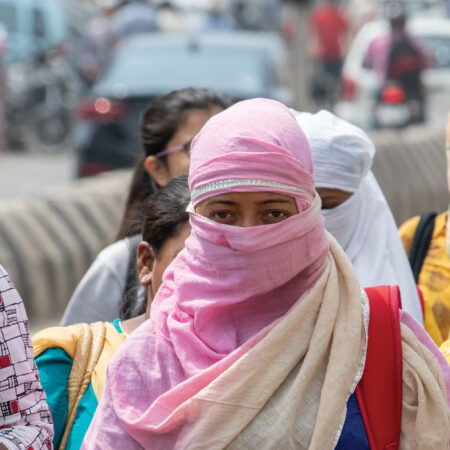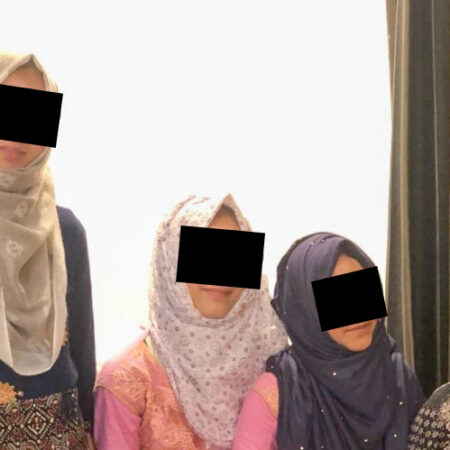After traveling to a large Indian city recently to study God’s Word for several days, a group of young Christians returned to their predominantly Muslim village emboldened in their Christian faith.
INDIA – Responding to Muslim Accusers
INDIA – Responding to Muslim Accusers
False Accusations

Though Muslims compose only about 15 percent of India’s total population, the country is still home to the third-largest Muslim population in the world.
While the youth were away for Bible training, neighbors questioned their parents about where the children had gone. Soon, various rumors began to spread through the community, including allegations of sexual abuse that made their way to the ears of Islamists.
As a small minority in the area, Christians must keep their faith secret. Believers often hide their Bibles, understanding that their discovery by Muslim neighbors could result in violence. “We know people from this community who have had their house burned down, been beaten, been kicked out of their home and kicked out of their family,” said Aarav, a front-line worker.
When the youth returned to the village, local Islamists interrogated them, following up on villagers’ accusations that they had been taken to the city for deviant sexual purposes. The entire community shunned the girls in the group, and their parents grew concerned.
One girl’s father, a known follower of Christ, feared that the girls might be taken from them permanently or even killed. In conservative Muslim communities, family members or others sometimes commit “honor killings” of individuals considered to have been sexually disgraced.
When pressured by the Islamists, the Christian man, Ali, grabbed a micro SD card and handed it to one of the Islamists. “This is what it is all about,” Ali said. “This is why they left.”
The Islamist took the SD card and reviewed its content, expecting to find pornography. But instead he heard the gospel. “This isn’t so bad,” another Islamist said. “It’s about Isa [Jesus].” Encouraged by their reaction, Ali felt emboldened to preach to the radicals. In that moment, he felt the Spirit’s nudge to proclaim Christ. “Repent! Come out of the darkness!” he told the radicals and village elders who had gathered.
Then, realizing the message on the SD card was talking about Jesus Christ of the Bible instead of the Prophet Isa in the Quran, the Islamists grew angry.
Determined to reconvert all of the Christian youth to Islam, they took them to a boarding school on their compound. While some of the youth were released or went into hiding, several girls were detained at the school for more than a month.
Spirit-Led Boldness

These teenagers were relatively new believers when they were taken to an Islamic school for “reconversion” to Islam. With the Holy Spirit’s guidance, they answered wisely and did not compromise their faith.
Since the girls had not been allowed to gather extra clothing or other daily necessities before being taken to the Islamic boarding school, they had no toothbrush, toothpaste, hairbrush or feminine hygiene products for several weeks. And they had no extra blankets to protect them from the chilly evening air. Eventually, however, the Islamists let the girls leave briefly to obtain basic necessities with money their parents had sent them.
Everyone at the school, from students to teachers, called the girls “Christians” as a derogatory term to mean “infidels” rather than “followers of Christ.” But they were prepared; they had learned during discipleship training that persecution is part of following Christ.
The oldest girl told a front-line worker that when she was with the other girls, sharing a windowless room at the school, she didn’t cry. Instead, she tried to display strength to the younger girls; they prayed together to overcome their shared fear and sadness. Then, one day, they were separated.
When the girls were split up, they were again interrogated by teachers at the school. Although the teachers tried to catch them in a lie, the girls — led by the Holy Spirit — always had the same responses to their questions.
The teachers were surprised by the girls’ consistency and boldness, and the girls were equally surprised by what they heard themselves saying. They often responded to the teachers’ questions with questions of their own, much as Jesus responded to His accusers.
Persecution Now Normal
One of the Christian girls had a severe lung condition, and her parents feared she would die without her medicine. Aware of the girl’s condition, a villager took the girl’s medical papers to the boarding school one day and demanded that all of the girls be released. Otherwise, the villager argued, they would have a death on their hands that would draw negative attention. Finally, 42 days after being taken from their families, the girls were released.
The girls’ faith grew immensely as a result of seeing how God provided for them and sustained them throughout their abduction, interrogations, lack of basic necessities, fear and grief from being taken from their families.
“They are proud to follow Jesus, and they are confident,” the front-line worker said. “There is not a struggle to be like everyone else. They know they want to follow Jesus even if that means they are different and not going to be accepted by their community.”
Today, the girls are still ostracized by their community, and they have been barred from attending their former schools. But they still participate in discipleship training, both in person and weekly over the phone.
“We want them to know what the Word says,” the front-line worker said, “that this is going to be normal for them.”

